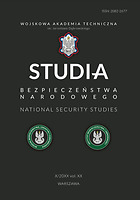NARUSZENIE ZASADY ZAUFANIA OBYWATELI DO ORGANÓW PAŃSTWA W ŚWIETLE ORZECZNICTWA SĄDÓW ADMINISTRACYJNYCH
VIOLATION OF THE PRINCIPLE OF CITIZENS TRUST IN STATE BODIES IN THE LIGHT OF THE CASE LAW OF ADMINISTRATIVE COURTS
Author(s): Natalia ChrzczonowskaSubject(s): Public Law, Administrative Law
Published by: Wojskowa Akademia Techniczna im. Jarosława Dąbrowskiego
Keywords: administrative law; public administration; public administration bodies; case law of administrative courts; principle of trust;
Summary/Abstract: Based on the analysis of the case law of administrative courts, it is possible to identify a number of examples of violations of the principle of instilling confidence in the public authorities of the participants of the proceedings. This article considers and analyzes the case law of administrative courts in which the principle of trust specified in Article 8 of the Code of Administrative Procedure was violated, leaving the interested parties unclear and even doubting the objectivity of the court. Taking into account the above circumstances, the purpose of this article is to consider the essence of the principle of citizens’ trust in public authorities and the irregularities occurring in this respect, as well as erroneous decisions that can be found in the jurisprudence of Polish administrative courts. However, the related research problem took the form of a question: what are the irregularities and violations of the principle of trust committed by this public authority in the light of the case law of administrative courts? The mistakes made have no explanation and usually appear in unknown circumstances. So, the questions arise: are mistakes made out of carelessness? However, are they an expression of incompetence of public administration employees who perform a number of different tasks leading to the end of the case? Both questions were analyzed in this article, and their essence was broadly developed based on the case law of the Supreme Admini- strative Court and the Provincial Administrative Court. In relation to the purpose and problem of the main article, the following research hypothesis was put forward: in the reality of frequent and not always careful changes in administrative law and employing “our own” (often without appropriate qualifications and competences) and complex legal situations, the possibility of violating the principle of trust (described in Article 8 of the Code Administrative Proceedings) is significant, although unacceptable. Confirmation of this hypothesis was provided by our own research, which was of a qualitative nature and was carried out using such research methods as: analysis of Article 8 of the Code of Administrative Procedure and, above all, the extensive case law of the Supreme Administrative Court and the Provincial Administrative Court regarding the subject of the article (i.e. the principle of trust of participants proceedings to public administration bodies) and analysis of the subject literature, as well as generalization and comparison. Generally, in the literature on the subject it is considered obvious that the violation of the principle of trust by judicial authorities as a result of resolving cases contrary to applicable legal provisions raises anxiety and a lack of trust among citizens towards public administration. This is all the more obvious because its duty is to protect the interests of citizens and pursue the truth, as well as to provide the assistance they expect. The analysis of the literature on the subject and the case law of administrative courts confirms the functioning of the violations indicated in the article and their reasons. The article also defines the concept of the “principle of trust” and indicates the consequences of violating its essence for the participants of the proceedings and society.
Journal: Studia Bezpieczeństwa Narodowego
- Issue Year: 33/2024
- Issue No: 3
- Page Range: 117-136
- Page Count: 20
- Language: Polish

